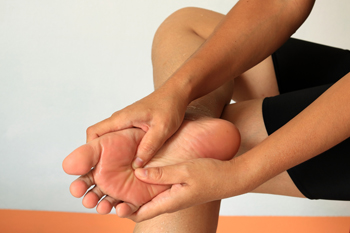Medical Conditions Can Lead to Foot Pain
Pain in one or more areas of the feet is a common condition many people contend with. Foot pain can come from breaking your foot or toe, or from medical conditions that can include gout, plantar fasciitis, bunions, and blisters. Patients who are overweight can have foot pain as a result of the added weight the feet have to endure. Diabetic patients are susceptible to ulcers developing on the feet, and this may cause mild to severe pain. Foot pain that develops gradually can come from wearing shoes that do not fit correctly. Conditions that may develop from this can include bunions, hammertoes, and ingrown toenails. If you are experiencing any type of foot pain, it is strongly suggested that you are under the care of a podiatrist.
Foot Pain
Foot pain can be extremely painful and debilitating. If you have a foot pain, consult with Dr. Joshua David Scoll from Pennsylvania. Our doctor will assess your condition and provide you with quality foot and ankle treatment.
Causes
Foot pain is a very broad condition that could be caused by one or more ailments. The most common include:
- Bunions
- Hammertoes
- Plantar Fasciitis
- Bone Spurs
- Corns
- Tarsal Tunnel Syndrome
- Ingrown Toenails
- Arthritis (such as Gout, Rheumatoid, and Osteoarthritis)
- Flat Feet
- Injury (from stress fractures, broken toe, foot, ankle, Achilles tendon ruptures, and sprains)
- And more
Diagnosis
To figure out the cause of foot pain, podiatrists utilize several different methods. This can range from simple visual inspections and sensation tests to X-rays and MRI scans. Prior medical history, family medical history, and any recent physical traumatic events will all be taken into consideration for a proper diagnosis.
Treatment
Treatment depends upon the cause of the foot pain. Whether it is resting, staying off the foot, or having surgery; podiatrists have a number of treatment options available for foot pain.
If you have any questions, please feel free to contact one of our offices located in Philadelphia, Bensalem, and Fairless Hills, PA . We offer the newest diagnostic and treatment technologies for all your foot care needs.
Are Bunions Hereditary?
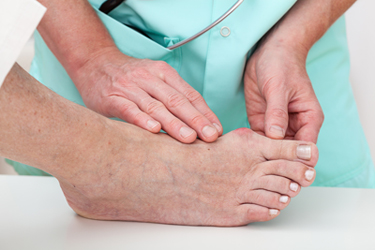 The place on the foot where bunions develop is the bottom of the big toe. Common symptoms that are present in larger bunions can consist of pain and swelling on and around the affected area, and skin that has become calloused on top of the bunion. Additionally, it may be difficult to wear shoes that are normally worn, and larger shoes may have to be purchased so the feet can feel comfortable. Patients who have developed bunions may have prior medical conditions that can include arthritis, cerebral palsy, in addition to genetics playing a significant role in developing a bunion. Mild relief may be found when custom-made orthotics are worn, and it may help to wear a protective pad over the bunion. If you have a bunion, and would like additional information about effective treatment options, please consult with a podiatrist.
The place on the foot where bunions develop is the bottom of the big toe. Common symptoms that are present in larger bunions can consist of pain and swelling on and around the affected area, and skin that has become calloused on top of the bunion. Additionally, it may be difficult to wear shoes that are normally worn, and larger shoes may have to be purchased so the feet can feel comfortable. Patients who have developed bunions may have prior medical conditions that can include arthritis, cerebral palsy, in addition to genetics playing a significant role in developing a bunion. Mild relief may be found when custom-made orthotics are worn, and it may help to wear a protective pad over the bunion. If you have a bunion, and would like additional information about effective treatment options, please consult with a podiatrist.
If you are suffering from bunions, contact Dr. Joshua David Scoll of Pennsylvania. Our doctor can provide the care you need to keep you pain-free and on your feet.
What Is a Bunion?
A bunion is formed of swollen tissue or an enlargement of boney growth, usually located at the base joint of the toe that connects to the foot. The swelling occurs due to the bones in the big toe shifting inward, which impacts the other toes of the foot. This causes the area around the base of the big toe to become inflamed and painful.
Why Do Bunions Form?
Genetics – Susceptibility to bunions are often hereditary
Stress on the feet – Poorly fitted and uncomfortable footwear that places stress on feet, such as heels, can worsen existing bunions
How Are Bunions Diagnosed?
Doctors often perform two tests – blood tests and x-rays – when trying to diagnose bunions, especially in the early stages of development. Blood tests help determine if the foot pain is being caused by something else, such as arthritis, while x-rays provide a clear picture of your bone structure to your doctor.
How Are Bunions Treated?
- Refrain from wearing heels or similar shoes that cause discomfort
- Select wider shoes that can provide more comfort and reduce pain
- Anti-inflammatory and pain management drugs
- Orthotics or foot inserts
- Surgery
If you have any questions, please feel free to contact one of our offices located in Philadelphia, Bensalem, and Fairless Hills, PA . We offer the newest diagnostic and treatment technologies for all your foot care needs.
Eating Healthy Foods May Help Swollen Feet
 Swollen feet is a condition many pregnant women battle with. This is a common foot ailment that can be a result of the growing baby, and thickened blood that can put pressure on the pelvis and feet. Additionally, specific hormones may cause the veins to become relaxed, and this may change the speed blood is moved throughout the body. It can be helpful to perform gentle foot stretches during the course of the day, which may alleviate a portion of the swelling. Research has indicated that staying hydrated by drinking plenty of water is important in reducing fluid that is stored in the tissues. This can also be achieved by eating healthy foods that can include asparagus, celery, watermelon, and other foods that can increase elimination of water. If you would like more information about how to reduce swelling in your feet, especially while you are pregnant, please speak with a podiatrist.
Swollen feet is a condition many pregnant women battle with. This is a common foot ailment that can be a result of the growing baby, and thickened blood that can put pressure on the pelvis and feet. Additionally, specific hormones may cause the veins to become relaxed, and this may change the speed blood is moved throughout the body. It can be helpful to perform gentle foot stretches during the course of the day, which may alleviate a portion of the swelling. Research has indicated that staying hydrated by drinking plenty of water is important in reducing fluid that is stored in the tissues. This can also be achieved by eating healthy foods that can include asparagus, celery, watermelon, and other foods that can increase elimination of water. If you would like more information about how to reduce swelling in your feet, especially while you are pregnant, please speak with a podiatrist.
Pregnant women with swollen feet can be treated with a variety of different methods that are readily available. For more information about other cures for swollen feet during pregnancy, consult with Dr. Joshua David Scoll from Pennsylvania. Our doctor will attend to all of your foot and ankle needs.
What Foot Problems Can Arise During Pregnancy?
One problem that can occur is overpronation, which occurs when the arch of the foot flattens and tends to roll inward. This can cause pain and discomfort in your heels while you’re walking or even just standing up, trying to support your baby.
Another problem is edema, or swelling in the extremities. This often affects the feet during pregnancy but tends to occur in the later stages.
How Can I Keep My Feet Healthy During Pregnancy?
- Wearing orthotics can provide extra support for the feet and help distribute weight evenly
- Minimize the amount of time spent walking barefoot
- Wear shoes with good arch support
- Wear shoes that allow for good circulation to the feet
- Elevate feet if you experience swelling
- Massage your feet
- Get regular, light exercise, such as walking, to promote blood circulation to the feet
If you have any questions please feel free to contact one of our offices located in Philadelphia, Bensalem, and Fairless Hills, PA . We offer the newest diagnostic and treatment technologies for all your foot and ankle needs.
How Do Gout Attacks Occur?
 Patients who experience gout are aware of the debilitating pain and discomfort this condition may cause. It affects the joints in the big toe, and is considered to be a form of arthritis. Gout can be caused for a variety of reasons. These can include genetic factors, eating foods that have elevated purine levels, or it may come from specific medical conditions. It occurs as a result of high uric acid levels in the blood. Patients have described the sensation of gout as crystals that form between the joints, and can cause severe pain and discomfort. There are methods that can be implemented which can possibly prevent future gout attacks. These can include losing excess weight, and avoiding foods consisting of red meat and seafood. Additionally, it is recommended that alcohol consumption is limited. If you are getting frequent gout attacks, it is suggested that you consult with a podiatrist as quickly as possible who can help you to manage and prevent this condition.
Patients who experience gout are aware of the debilitating pain and discomfort this condition may cause. It affects the joints in the big toe, and is considered to be a form of arthritis. Gout can be caused for a variety of reasons. These can include genetic factors, eating foods that have elevated purine levels, or it may come from specific medical conditions. It occurs as a result of high uric acid levels in the blood. Patients have described the sensation of gout as crystals that form between the joints, and can cause severe pain and discomfort. There are methods that can be implemented which can possibly prevent future gout attacks. These can include losing excess weight, and avoiding foods consisting of red meat and seafood. Additionally, it is recommended that alcohol consumption is limited. If you are getting frequent gout attacks, it is suggested that you consult with a podiatrist as quickly as possible who can help you to manage and prevent this condition.
Gout is a foot condition that requires certain treatment and care. If you are seeking treatment, contact Dr. Joshua David Scoll from Pennsylvania. Our doctor will treat your foot and ankle needs.
What Is Gout?
Gout is a type of arthritis caused by a buildup of uric acid in the bloodstream. It often develops in the foot, especially the big toe area, although it can manifest in other parts of the body as well. Gout can make walking and standing very painful and is especially common in diabetics and the obese.
People typically get gout because of a poor diet. Genetic predisposition is also a factor. The children of parents who have had gout frequently have a chance of developing it themselves.
Gout can easily be identified by redness and inflammation of the big toe and the surrounding areas of the foot. Other symptoms include extreme fatigue, joint pain, and running high fevers. Sometimes corticosteroid drugs can be prescribed to treat gout, but the best way to combat this disease is to get more exercise and eat a better diet.
If you have any questions please feel free to contact one of our offices located in Philadelphia, Bensalem, and Fairless Hills, PA . We offer the newest diagnostic and treatment technologies for all your foot and ankle needs.
Why Do My Feet Tingle?
 There are several reasons why patients may experience poor circulation in the feet. These can include the aging process, having blood clots, or possibly from living in a cold environment. Additional reasons can consist of smoking, leading a sedentary lifestyle, or living with medical conditions such as diabetes. Some of the symptoms that are associated with poor circulation can consist of a tingling or numbing sensation, swelling, and the feet may look discolored. This condition may be improved by implementing a healthy lifestyle that includes frequently exercising and eating fresh fruits and vegetables. Many patients find it helpful to elevate the feet during the day, as this may help to reduce existing swelling. If you have symptoms of poor circulation in the feet, please consult with a podiatrist as quickly as possible who can help you to manage this condition.
There are several reasons why patients may experience poor circulation in the feet. These can include the aging process, having blood clots, or possibly from living in a cold environment. Additional reasons can consist of smoking, leading a sedentary lifestyle, or living with medical conditions such as diabetes. Some of the symptoms that are associated with poor circulation can consist of a tingling or numbing sensation, swelling, and the feet may look discolored. This condition may be improved by implementing a healthy lifestyle that includes frequently exercising and eating fresh fruits and vegetables. Many patients find it helpful to elevate the feet during the day, as this may help to reduce existing swelling. If you have symptoms of poor circulation in the feet, please consult with a podiatrist as quickly as possible who can help you to manage this condition.
Poor circulation is a serious condition and needs immediate medical attention. If you have any concerns with poor circulation in your feet contact Dr. Joshua David Scoll of Pennsylvania. Our doctor will treat your foot and ankle needs.
Poor Circulation in the Feet
Poor blood circulation in the feet and legs is can be caused by peripheral artery disease (PAD), which is the result of a buildup of plaque in the arteries.
Plaque buildup or atherosclerosis results from excess calcium and cholesterol in the bloodstream. This can restrict the amount of blood which can flow through the arteries. Poor blood circulation in the feet and legs are sometimes caused by inflammation in the blood vessels, known as vasculitis.
Causes
Lack of oxygen and oxygen from poor blood circulation restricts muscle growth and development. It can also cause:
- Muscle pain, stiffness, or weakness
- Numbness or cramping in the legs
- Skin discoloration
- Slower nail & hair growth
- Erectile dysfunction
Those who have diabetes or smoke are at greatest risk for poor circulation, as are those who are over 50. If you have poor circulation in the feet and legs it may be caused by PAD and is important to make changes to your lifestyle in order to reduce risk of getting a heart attack or stroke. Exercise and maintaining a healthy lifestyle will dramatically improve conditions.
As always, see a podiatrist as he or she will assist in finding a regimen that suits you. A podiatrist can also prescribe you any needed medication.
If you have any questions please feel free to contact one of our offices located in Philadelphia, Bensalem, and Fairless Hills, PA . We offer the newest diagnostic and treatment technologies for all your foot and ankle needs.
Why Do My Feet Sweat?
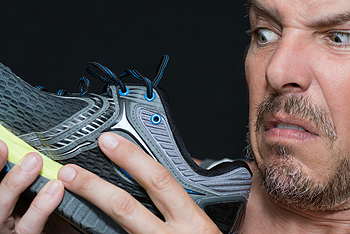 Plantar hyperhidrosis is defined as excessive sweating of the feet. This is typically an uncomfortable condition, and it can cause difficulty in completing daily activities. The feet may emit an unpleasant odor, making many patients embarrassed to have this condition. This ailment can develop for a variety of reasons. These may include genetic factors, menopause, or possibly from having a thyroid disorder. Additionally, it can develop from taking specific medications that may include antidepressants. If you have plantar hyperhidrosis, it is strongly advised that you seek the counsel of a podiatrist who can properly guide you toward beginning the correct treatment techniques.
Plantar hyperhidrosis is defined as excessive sweating of the feet. This is typically an uncomfortable condition, and it can cause difficulty in completing daily activities. The feet may emit an unpleasant odor, making many patients embarrassed to have this condition. This ailment can develop for a variety of reasons. These may include genetic factors, menopause, or possibly from having a thyroid disorder. Additionally, it can develop from taking specific medications that may include antidepressants. If you have plantar hyperhidrosis, it is strongly advised that you seek the counsel of a podiatrist who can properly guide you toward beginning the correct treatment techniques.
If you are suffering from hyperhidrosis contact Dr. Joshua David Scoll of Pennsylvania. Our doctor can provide the care you need to attend to all of your foot and ankle needs.
Hyperhidrosis of the Feet
Hyperhidrosis is a rare disorder that can cause people to have excessive sweating of their feet. This can usually occur all on its own without rigorous activity involved. People who suffer from hyperhidrosis may also experience sweaty palms.
Although it is said that sweating is a healthy process meant to cool down the body temperature and to maintain a proper internal temperature, hyperhidrosis may prove to be a huge hindrance on a person’s everyday life.
Plantar hyperhidrosis is considered to be the main form of hyperhidrosis. Secondary hyperhidrosis can refer to sweating that occurs in areas other than the feet or hands and armpits. Often this may be a sign of it being related to another medical condition such as menopause, hyperthyroidism and even Parkinson’s disease.
In order to alleviate this condition, it is important to see your doctor so that they may prescribe the necessary medications so that you can begin to live a normal life again. If this is left untreated, it is said that it will persist throughout an individual’s life.
A last resort approach would be surgery, but it is best to speak with your doctor to find out what may be the best treatment for you.
If you have any questions please feel free to contact one of our offices located in Philadelphia, Bensalem, and Fairless Hills, PA . We offer the newest diagnostic and treatment technologies for all your foot and ankle needs.
Diabetes and Neuropathy
 People who have diabetes often have diabetic neuropathy. This is a common condition among these types of patients, and it generally occurs from high blood sugar levels or an inflammation of the autoimmune system. Common symptoms of diabetic neuropathy can include a tingling sensation, the inability to feel any cuts or wounds on the feet, and it may be difficult to feel temperature change. In severe cases, patients may lose their balance, fall, and have additional foot injuries. There are specific tests that can be administered that may confirm this condition. These can consist of nerve studies for the arms and legs, and muscle tone can be evaluated by having an electromyography (EMG) performed. If you have diabetes, and are experiencing signs of neuropathy in your feet, it is strongly advised that you are under the care of a podiatrist.
People who have diabetes often have diabetic neuropathy. This is a common condition among these types of patients, and it generally occurs from high blood sugar levels or an inflammation of the autoimmune system. Common symptoms of diabetic neuropathy can include a tingling sensation, the inability to feel any cuts or wounds on the feet, and it may be difficult to feel temperature change. In severe cases, patients may lose their balance, fall, and have additional foot injuries. There are specific tests that can be administered that may confirm this condition. These can consist of nerve studies for the arms and legs, and muscle tone can be evaluated by having an electromyography (EMG) performed. If you have diabetes, and are experiencing signs of neuropathy in your feet, it is strongly advised that you are under the care of a podiatrist.
Neuropathy
Neuropathy can be a potentially serious condition, especially if it is left undiagnosed. If you have any concerns that you may be experiencing nerve loss in your feet, consult with Dr. Joshua David Scoll from Pennsylvania. Our doctor will assess your condition and provide you with quality foot and ankle treatment for neuropathy.
What Is Neuropathy?
Neuropathy is a condition that leads to damage to the nerves in the body. Peripheral neuropathy, or neuropathy that affects your peripheral nervous system, usually occurs in the feet. Neuropathy can be triggered by a number of different causes. Such causes include diabetes, infections, cancers, disorders, and toxic substances.
Symptoms of Neuropathy Include:
- Numbness
- Sensation loss
- Prickling and tingling sensations
- Throbbing, freezing, burning pains
- Muscle weakness
Those with diabetes are at serious risk due to being unable to feel an ulcer on their feet. Diabetics usually also suffer from poor blood circulation. This can lead to the wound not healing, infections occurring, and the limb may have to be amputated.
Treatment
To treat neuropathy in the foot, podiatrists will first diagnose the cause of the neuropathy. Figuring out the underlying cause of the neuropathy will allow the podiatrist to prescribe the best treatment, whether it be caused by diabetes, toxic substance exposure, infection, etc. If the nerve has not died, then it’s possible that sensation may be able to return to the foot.
Pain medication may be issued for pain. Electrical nerve stimulation can be used to stimulate nerves. If the neuropathy is caused from pressure on the nerves, then surgery may be necessary.
If you have any questions, please feel free to contact one of our offices located in Philadelphia, Bensalem, and Fairless Hills, PA . We offer the newest diagnostic and treatment technologies for all your foot care needs.
Can I Stretch to Prevent Running Injuries?
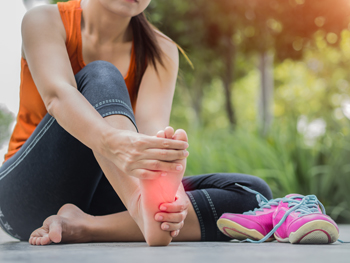 Research has indicated that there are many benefits of running. People who enjoy this sport are often aware of the positive aspects cardiovascular exercise can provide. These may include producing endorphins, keeping the heart and body healthy, and shedding excess weight. Many runners know the importance of warming up before and after a run, as this may be helpful in preventing running injuries. Achilles tendonitis is a common running injury. This tendon connects the calf muscles to the heel, and can become quite painful if it becomes torn or injured. This type of injury can possibly be prevented by performing heel raises, and this may be beneficial in strengthening the calves. Additionally, patients may experience plantar fasciitis. This is an inflammation of the plantar fascia, which is the portion of tissue that connects the heel to the toes. A common prevention technique can include wearing shoes that fit correctly, and practicing specific foot stretches. If you would like additional information about how running injuries can affect the feet, please consult with a podiatrist.
Research has indicated that there are many benefits of running. People who enjoy this sport are often aware of the positive aspects cardiovascular exercise can provide. These may include producing endorphins, keeping the heart and body healthy, and shedding excess weight. Many runners know the importance of warming up before and after a run, as this may be helpful in preventing running injuries. Achilles tendonitis is a common running injury. This tendon connects the calf muscles to the heel, and can become quite painful if it becomes torn or injured. This type of injury can possibly be prevented by performing heel raises, and this may be beneficial in strengthening the calves. Additionally, patients may experience plantar fasciitis. This is an inflammation of the plantar fascia, which is the portion of tissue that connects the heel to the toes. A common prevention technique can include wearing shoes that fit correctly, and practicing specific foot stretches. If you would like additional information about how running injuries can affect the feet, please consult with a podiatrist.
All runners should take extra precaution when trying to avoid injury. If you have any concerns about your feet, contact Dr. Joshua David Scoll of Pennsylvania. Our doctor will treat your foot and ankle needs.
How to Prevent Running Injuries
There are a lot of mistakes a runner can make prior to a workout that can induce injury. A lot of athletes tend to overstretch before running, instead of saving those workouts for a post-run routine. Deep lunges and hand-to-toe hamstring pulls should be performed after a workout instead of during a warmup. Another common mistake is jumping into an intense routine before your body is physically prepared for it. You should try to ease your way into long-distance running instead of forcing yourself to rush into it.
More Tips for Preventing Injury
- Incorporate Strength Training into Workouts - This will help improve the body’s overall athleticism
- Improve and Maintain Your Flexibility – Stretching everyday will help improve overall performance
- “Warm Up” Before Running and “Cool Down” Afterward – A warm up of 5-10 minutes helps get rid of lactic acid in the muscles and prevents delayed muscle soreness
- Cross-Training is Crucial
- Wear Proper Running Shoes
- Have a Formal Gait Analysis – Poor biomechanics can easily cause injury
If you have any questions, please feel free to contact one of our offices located in Philadelphia, Bensalem, and Fairless Hills, PA . We offer the newest diagnostic and treatment technologies for all your foot care needs.
Babies and Flat Feet
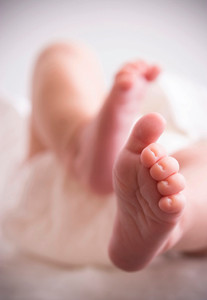 Research has indicated that the majority of infants are born with flat feet, and the arch will generally be fully formed by approximately ten years of age. There is a small percentage of children where this does not occur, and surgery can be an option that may help to form the arch. There are common symptoms that are typically associated with flat feet. These can consist of pain and discomfort on the inside of the ankle, the arches of your foot, the calf, and the outside of your foot. Existing medical conditions may prevent an arch from developing. These conditions can often include specific types of arthritis, cerebral palsy, or obesity. If you believe you are afflicted with flat feet, it is strongly suggested that you are under the care of a podiatrist who can offer you correct treatment options.
Research has indicated that the majority of infants are born with flat feet, and the arch will generally be fully formed by approximately ten years of age. There is a small percentage of children where this does not occur, and surgery can be an option that may help to form the arch. There are common symptoms that are typically associated with flat feet. These can consist of pain and discomfort on the inside of the ankle, the arches of your foot, the calf, and the outside of your foot. Existing medical conditions may prevent an arch from developing. These conditions can often include specific types of arthritis, cerebral palsy, or obesity. If you believe you are afflicted with flat feet, it is strongly suggested that you are under the care of a podiatrist who can offer you correct treatment options.
Flatfoot is a condition many people suffer from. If you have flat feet, contact Dr. Joshua David Scoll from Pennsylvania. Our doctor will treat your foot and ankle needs.
What Are Flat Feet?
Flatfoot is a condition in which the arch of the foot is depressed and the sole of the foot is almost completely in contact with the ground. About 20-30% of the population generally has flat feet because their arches never formed during growth.
Conditions & Problems:
Having flat feet makes it difficult to run or walk because of the stress placed on the ankles.
Alignment – The general alignment of your legs can be disrupted, because the ankles move inward which can cause major discomfort.
Knees – If you have complications with your knees, flat feet can be a contributor to arthritis in that area.
Symptoms
- Pain around the heel or arch area
- Trouble standing on the tip toe
- Swelling around the inside of the ankle
- Flat look to one or both feet
- Having your shoes feel uneven when worn
Treatment
If you are experiencing pain and stress on the foot you may weaken the posterior tibial tendon, which runs around the inside of the ankle.
If you have any questions please feel free to contact one of our offices located in Philadelphia, Bensalem, and Fairless Hills, PA . We offer the newest diagnostic and treatment technologies for all your foot and ankle needs.
Why Do Blisters Form?
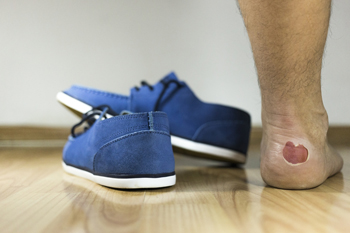 A blister generally forms as a result of excess friction. When a blister develops on the feet, walking, running, and performing daily activities may be difficult to accomplish. Blisters are considered to be common among those who enjoy sports and hiking. They are defined as a pocket of fluid that forms over the affected portion of skin, which is the body’s natural method of protecting the damaged skin. When new skin has formed, the blister will gradually drain. There are methods that can be implemented which may help to prevent blisters. These may include wearing shoes that fit correctly, and wearing socks that are made of breathable materials. Additionally, it may help to wear cushioned insoles that can provide extra comfort. If you are afflicted with blisters on the feet, it is advised that you speak with a podiatrist who can properly treat this condition.
A blister generally forms as a result of excess friction. When a blister develops on the feet, walking, running, and performing daily activities may be difficult to accomplish. Blisters are considered to be common among those who enjoy sports and hiking. They are defined as a pocket of fluid that forms over the affected portion of skin, which is the body’s natural method of protecting the damaged skin. When new skin has formed, the blister will gradually drain. There are methods that can be implemented which may help to prevent blisters. These may include wearing shoes that fit correctly, and wearing socks that are made of breathable materials. Additionally, it may help to wear cushioned insoles that can provide extra comfort. If you are afflicted with blisters on the feet, it is advised that you speak with a podiatrist who can properly treat this condition.
Blisters are prone to making everyday activities extremely uncomfortable. If your feet are hurting, contact Dr. Joshua David Scoll of Pennsylvania. Our doctor can provide the care you need to keep you pain-free and on your feet.
Foot Blisters
Foot blisters develop as a result of constantly wearing tight or ill-fitting footwear. This happens due to the constant rubbing from the shoe, which can often lead to pain.
What Are Foot Blisters?
A foot blister is a small fluid-filled pocket that forms on the upper-most layer of the skin. Blisters are filled with clear fluid and can lead to blood drainage or pus if the area becomes infected.
How Do Blisters Form?
Blisters on the feet are often the result of constant friction of skin and material, usually by shoe rubbing. Walking in sandals, boots, or shoes that don’t fit properly for long periods of time can result in a blister. Having consistent foot moisture and humidity can easily lead to blister formation.
Prevention & Treatment
It is important to properly care for the affected area in order to prevent infection and ease the pain. Do not lance the blister and use a Band-Aid to provide pain relief. Also, be sure to keep your feet dry and wear proper fitting shoes. If you see blood or pus in a blister, seek assistance from a podiatrist.
If you have any questions, please feel free to contact one of our offices located in Philadelphia, Bensalem, and Fairless Hills, PA . We offer the newest diagnostic and treatment technologies for all your foot care needs.
Methods That May Help to Prevent Falling
 It is crucial for elderly patients to protect themselves in their homes. This may be helpful in preventing falling, which can cause serious health issues and complications with the feet. It may be beneficial to slow your pace as you walk and complete tasks in your home. Additionally, it can help to wear slippers that have a non-slip sole. Research has indicated that when grab bars are installed in the shower and bath area, the risk of falling may be reduced. It is important to have routine medical exams so current prescriptions may be evaluated, in addition to having a thorough eye exam. If you would like more information about falls prevention techniques and how to help protect your feet, it’s suggested that you consult with a podiatrist.
It is crucial for elderly patients to protect themselves in their homes. This may be helpful in preventing falling, which can cause serious health issues and complications with the feet. It may be beneficial to slow your pace as you walk and complete tasks in your home. Additionally, it can help to wear slippers that have a non-slip sole. Research has indicated that when grab bars are installed in the shower and bath area, the risk of falling may be reduced. It is important to have routine medical exams so current prescriptions may be evaluated, in addition to having a thorough eye exam. If you would like more information about falls prevention techniques and how to help protect your feet, it’s suggested that you consult with a podiatrist.
Preventing falls among the elderly is very important. If you are older and have fallen or fear that you are prone to falling, consult with Dr. Joshua David Scoll from Pennsylvania. Our doctor will assess your condition and provide you with quality advice and care.
Every 11 seconds, an elderly American is being treated in an emergency room for a fall related injury. Falls are the leading cause of head and hip injuries for those 65 and older. Due to decreases in strength, balance, senses, and lack of awareness, elderly persons are very susceptible to falling. Thankfully, there are a number of things older persons can do to prevent falls.
How to Prevent Falls
Some effective methods that older persons can do to prevent falls include:
- Enrolling in strength and balance exercise program to increase balance and strength
- Periodically having your sight and hearing checked
- Discuss any medications you have with a doctor to see if it increases the risk of falling
- Clearing the house of falling hazards and installing devices like grab bars and railings
- Utilizing a walker or cane
- Wearing shoes that provide good support and cushioning
- Talking to family members about falling and increasing awareness
Falling can be a traumatic and embarrassing experience for elderly persons; this can make them less willing to leave the house, and less willing to talk to someone about their fears of falling. Doing such things, however, will increase the likelihood of tripping or losing one’s balance. Knowing the causes of falling and how to prevent them is the best way to mitigate the risk of serious injury.
If you have any questions, please feel free to contact one of our offices located in Philadelphia, Bensalem, and Fairless Hills, PA . We offer the newest diagnostic and treatment technologies for all your foot care needs.
Methods That Can Determine Shoe Size
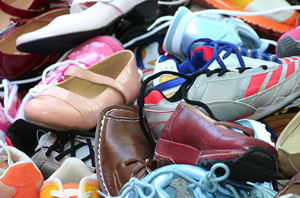 Research has indicated that it is incredibly important to wear shoes that fit your feet correctly. This may be helpful in preventing unwanted foot conditions from developing that can include hammertoes, bunions, and blisters. There are several methods that can be implemented to obtain an accurate measurement. Your foot can be traced on a large piece of paper while wearing socks that are normally worn, along with a pair of shoes you typically wear. Brannock devices are typically found in shoe stores, and can be effective in determining the correct shoe size. When running shoes are purchased, it is important to ensure that there is adequate room for the toes to move freely in. Your feet may change size if weight is gained, or if a foot injury has occurred, which is why it’s beneficial to have a current measurement taken. If you would like to have a podiatrist properly measure your feet, it is suggested that you schedule an appointment.
Research has indicated that it is incredibly important to wear shoes that fit your feet correctly. This may be helpful in preventing unwanted foot conditions from developing that can include hammertoes, bunions, and blisters. There are several methods that can be implemented to obtain an accurate measurement. Your foot can be traced on a large piece of paper while wearing socks that are normally worn, along with a pair of shoes you typically wear. Brannock devices are typically found in shoe stores, and can be effective in determining the correct shoe size. When running shoes are purchased, it is important to ensure that there is adequate room for the toes to move freely in. Your feet may change size if weight is gained, or if a foot injury has occurred, which is why it’s beneficial to have a current measurement taken. If you would like to have a podiatrist properly measure your feet, it is suggested that you schedule an appointment.
It is important to find shoes that fit you properly in order to avoid a variety of different foot problems. For more information about treatment, contact Dr. Joshua David Scoll from Pennsylvania. Our doctor will treat your foot and ankle needs.
Proper Shoe Fitting
Shoes have many different functions. They cushion our body weight, protect our feet, and allow us to safely play sports. You should always make sure that the shoes you wear fit you properly in order to avoid injuries and deformities such as: bunions, corns, calluses, hammertoes, plantar fasciitis, stress fractures, and more. It is important to note that although a certain pair of shoes might be a great fit for someone else, that doesn’t mean they will be a great fit for you. This is why you should always try on shoes before buying them to make sure they are worth the investment. Typically, shoes need to be replaced ever six months to one year of regular use.
Tips for Proper Shoe Fitting
- Select a shoe that is shaped like your foot
- Don’t buy shoes that fit too tight, expecting them to stretch to fit
- Make sure there is enough space (3/8” to ½”) for your longest toe at the end of each shoe when you are standing up
- Walk in the shoes to make sure they fit and feel right
- Don’t select shoes by the size marked inside the shoe, but by how the shoe fits your foot
The shoes you buy should always feel as good as they look. Shoes that fit properly will last longer, feel better, and improve your way of life each day.
If you have any questions, please feel free to contact one of our offices located in Philadelphia, Bensalem, and Fairless Hills, PA . We offer the newest diagnostic and treatment technologies for all your foot care needs.
More...
Possible Causes of Stress Fractures
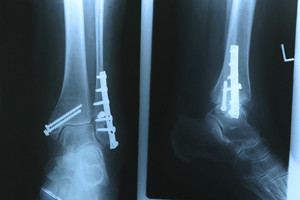 Stress fractures are defined as a small break in one or more bones in the feet. They can occur as a result of frequently running for extended periods of time, or from participating in jumping activities. Additionally, they may happen if there is a change in the style of jogging you’re used to, or a change in the running surface. A common symptom that is associated with stress fractures can include pain during physical activity. This pain may also return after resting. Typically, effective treatment generally means the activity must be ceased that caused the fracture, and a boot or cast may be recommended for the healing process. If you have pain in your foot and think you may have a stress fracture, it is strongly advised that you speak to a podiatrist who can help you to manage this condition.
Stress fractures are defined as a small break in one or more bones in the feet. They can occur as a result of frequently running for extended periods of time, or from participating in jumping activities. Additionally, they may happen if there is a change in the style of jogging you’re used to, or a change in the running surface. A common symptom that is associated with stress fractures can include pain during physical activity. This pain may also return after resting. Typically, effective treatment generally means the activity must be ceased that caused the fracture, and a boot or cast may be recommended for the healing process. If you have pain in your foot and think you may have a stress fracture, it is strongly advised that you speak to a podiatrist who can help you to manage this condition.
Activities where too much pressure is put on the feet can cause stress fractures. To learn more, contact Dr. Joshua David Scoll from Pennsylvania. Our doctor can provide the care you need to keep your pain free and on your feet.
Dealing with Stress Fractures of the Foot and Ankle
Stress fractures occur in the foot and ankle when muscles in these areas weaken from too much or too little use. The feet and ankles then lose support when walking or running from the impact of the ground. Since there is no protection, the bones receive the full impact of each step. Stress on the feet can cause cracks to form in the bones, thus creating stress fractures.
What Are Stress Fractures?
Stress fractures occur frequently in individuals whose daily activities cause great impact on the feet and ankles. Stress factors are most common among:
- Runners
- People affected with Osteoporosis
- Tennis or basketball players
- Gymnasts
- High impact workouts
Symptoms
Pain from the fractures occur in the area of the fractures and can be constant or intermittent. It will often cause sharp or dull pain with swelling and tenderness. Engaging in any kind of activity which involves high impact will aggravate pain.
If you have any questions please feel free to contact one of our offices located in Philadelphia, Bensalem, and Fairless Hills, PA . We offer the newest diagnostic and treatment technologies for all your foot and ankle needs.
Treating Your Child’s Ingrown Toenail
 When it comes to caring for your child’s feet, it’s important you look for symptoms of any existing or developing foot conditions. One common condition that can develop among babies and young children is an ingrown toenail. Ingrown toenails are characterized by a toenail that grows into the skin on the side of the toe, often appearing red and swollen. Typically, it is more common that the big toe is affected by this condition. In more severe cases, a white or yellowish liquid may drain from the affected toe, which normally is a sign that an infection in present. To help prevent this condition from afflicting your child’s toes, it’s recommended that you make sure you’re cutting their toenails straight across and that they wear footwear that is not too constricting or tightly fitted. Ingrown toenails are often quite painful and should be treated with professional care. For a safe recovery, and to avoid the development of an infection, we suggest you consult with a podiatrist as soon as possible to treat your child’s ingrown toenail.
When it comes to caring for your child’s feet, it’s important you look for symptoms of any existing or developing foot conditions. One common condition that can develop among babies and young children is an ingrown toenail. Ingrown toenails are characterized by a toenail that grows into the skin on the side of the toe, often appearing red and swollen. Typically, it is more common that the big toe is affected by this condition. In more severe cases, a white or yellowish liquid may drain from the affected toe, which normally is a sign that an infection in present. To help prevent this condition from afflicting your child’s toes, it’s recommended that you make sure you’re cutting their toenails straight across and that they wear footwear that is not too constricting or tightly fitted. Ingrown toenails are often quite painful and should be treated with professional care. For a safe recovery, and to avoid the development of an infection, we suggest you consult with a podiatrist as soon as possible to treat your child’s ingrown toenail.
Making sure that your children maintain good foot health is very important as they grow. If you have any questions, contact Dr. Joshua David Scoll of Pennsylvania. Our doctor can provide the care you need to keep you pain-free and on your feet.
Keeping Children's Feet Healthy
Having healthy feet during childhood can help prevent medical problems later in life, namely in the back and legs. As children grow, their feet require different types of care. Here are some things to consider...
Although babies do not walk yet, it is still very important to take care of their feet.
Avoid putting tight shoes or socks on his or her feet.
Allow the baby to stretch and kick his or her feet to feel comfortable.
As a toddler, kids are now on the move and begin to develop differently. At this age, toddlers are getting a feel for walking, so don’t be alarmed if your toddler is unsteady or ‘walks funny’.
As your child gets older, it is important to teach them how to take care of their feet.
Show them proper hygiene to prevent infections such as fungus.
Be watchful for any pain or injury.
Have all injuries checked by a doctor as soon as possible.
Comfortable, protective shoes should always be worn, especially at play.
If you have any questions please feel free to contact one of our offices located in Philadelphia, Bensalem, and Fairless Hills, PA . We offer the newest diagnostic and treatment technologies for all your foot and ankle needs.
Possible Risk Factors For Developing Gout
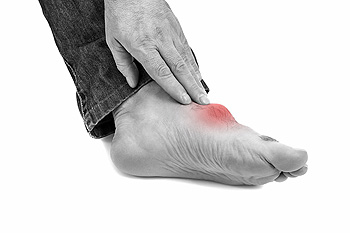 Patients who experience the ailment that is referred to as gout are often aware of the pain and discomfort that accompanies this condition. This form of arthritis typically affects the joints of the big toe, and may cause the toe to become red and swollen. It occurs as a result of crystals that form in the joints of the foot. This can happen from elevated uric acid levels in blood, which may come from certain foods that are eaten. These types of foods that have high purine levels may include shellfish, red meat, and drinks that have excess sugar. Patients may be more susceptible to developing gout if they are obese or diabetic. There are measures that may be implemented which may prevent gout attacks from occurring. These can consist of drinking plenty of water daily, losing excess weight, and living a healthy lifestyle. If you are afflicted with gout, it is strongly advised that you are under the care of a podiatrist who can properly treat this condition.
Patients who experience the ailment that is referred to as gout are often aware of the pain and discomfort that accompanies this condition. This form of arthritis typically affects the joints of the big toe, and may cause the toe to become red and swollen. It occurs as a result of crystals that form in the joints of the foot. This can happen from elevated uric acid levels in blood, which may come from certain foods that are eaten. These types of foods that have high purine levels may include shellfish, red meat, and drinks that have excess sugar. Patients may be more susceptible to developing gout if they are obese or diabetic. There are measures that may be implemented which may prevent gout attacks from occurring. These can consist of drinking plenty of water daily, losing excess weight, and living a healthy lifestyle. If you are afflicted with gout, it is strongly advised that you are under the care of a podiatrist who can properly treat this condition.
Gout is a painful condition that can be treated. If you are seeking treatment, contact Dr. Joshua David Scoll from Pennsylvania. Our doctor will treat your foot and ankle needs.
What Is Gout?
Gout is a form of arthritis that is characterized by sudden, severe attacks of pain, redness, and tenderness in the joints. The condition usually affects the joint at the base of the big toe. A gout attack can occur at any random time, such as the middle of the night while you are asleep.
Symptoms
- Intense Joint Pain - Usually around the large joint of your big toe, and it most severe within the first four to twelve hours
- Lingering Discomfort - Joint discomfort may last from a few days to a few weeks
- Inflammation and Redness -Affected joints may become swollen, tender, warm and red
- Limited Range of Motion - May experience a decrease in joint mobility
Risk Factors
- Genetics - If family members have gout, you’re more likely to have it
- Medications - Diuretic medications can raise uric acid levels
- Gender/Age - Gout is more common in men until the age of 60. It is believed that estrogen protects women until that point
- Diet - Eating red meat and shellfish increases your risk
- Alcohol - Having more than two alcoholic drinks per day increases your risk
- Obesity - Obese people are at a higher risk for gout
Prior to visiting your podiatrist to receive treatment for gout, there are a few things you should do beforehand. If you have gout you should write down your symptoms--including when they started and how often you experience them, important medical information you may have, and any questions you may have. Writing down these three things will help your podiatrist in assessing your specific situation so that he or she may provide the best route of treatment for you.
If you have any questions, please feel free to contact one of our offices located in Philadelphia, Bensalem, and Fairless Hills, PA . We offer the newest diagnostic and treatment technologies for all your foot care needs.
Possible Treatments for Bunions
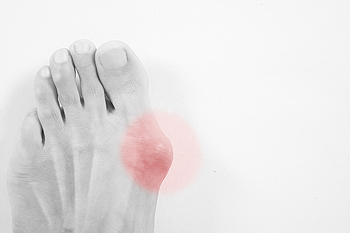 A protrusion on the side of the big toe may indicate a bunion has developed. They can gradually increase in size, and may cause pain and discomfort. Reasons why bunions may develop include genetic factors, wearing shoes that do not fit correctly, or possibly from an injury. Additionally, medical conditions such as gout and rheumatoid arthritis may contribute to the development of a bunion. Some patients find relief for bunions that are not severe by wearing a pad over the area. This may help to protect the bunion from rubbing against the side of the shoe. For severe bunions, surgery may be necessary for permanent removal. If you are afflicted with this condition, it is strongly advised that you consult with a podiatrist who can help you to make the right choice for treatment.
A protrusion on the side of the big toe may indicate a bunion has developed. They can gradually increase in size, and may cause pain and discomfort. Reasons why bunions may develop include genetic factors, wearing shoes that do not fit correctly, or possibly from an injury. Additionally, medical conditions such as gout and rheumatoid arthritis may contribute to the development of a bunion. Some patients find relief for bunions that are not severe by wearing a pad over the area. This may help to protect the bunion from rubbing against the side of the shoe. For severe bunions, surgery may be necessary for permanent removal. If you are afflicted with this condition, it is strongly advised that you consult with a podiatrist who can help you to make the right choice for treatment.
If you are suffering from bunion pain, contact Dr. Joshua David Scoll of Pennsylvania. Our doctor can provide the care you need to keep you pain-free and on your feet.
What Is a Bunion?
Bunions are painful bony bumps that usually develop on the inside of the foot at the joint of the big toe. As the deformity increases over time, it may become painful to walk and wear shoes. Women are more likely to exacerbate existing bunions since they often wear tight, narrow shoes that shift their toes together. Bunion pain can be relieved by wearing wider shoes with enough room for the toes.
Causes
- Genetics – some people inherit feet that are more prone to bunion development
- Inflammatory Conditions - rheumatoid arthritis and polio may cause bunion development
Symptoms
- Redness and inflammation
- Pain and tenderness
- Callus or corns on the bump
- Restricted motion in the big toe
In order to diagnose your bunion, your podiatrist may ask about your medical history, symptoms, and general health. Your doctor might also order an x-ray to take a closer look at your feet. Nonsurgical treatment options include orthotics, padding, icing, changes in footwear, and medication. If nonsurgical treatments don’t alleviate your bunion pain, surgery may be necessary.
If you have any questions, please feel free to contact one of our offices located in Philadelphia, Bensalem, and Fairless Hills, PA . We offer the newest diagnostic and treatment technologies for all your foot care needs.

